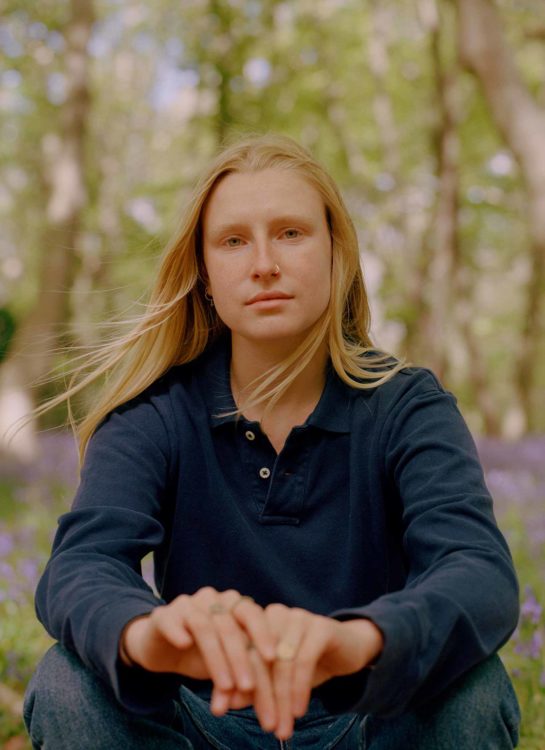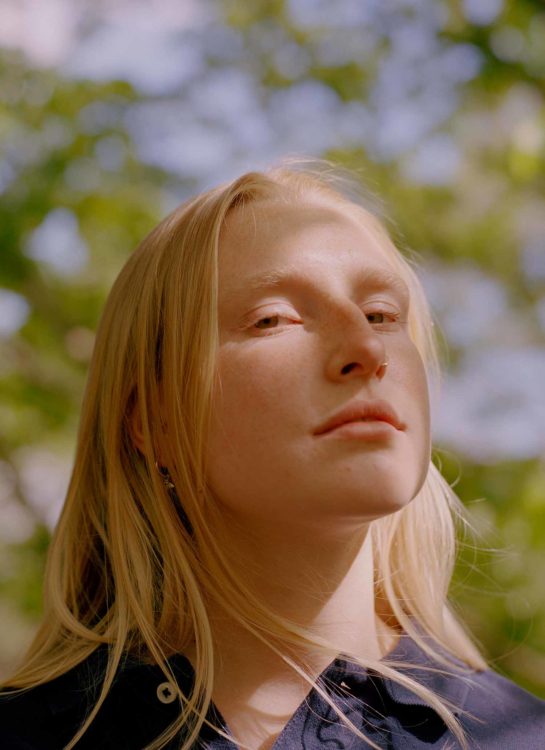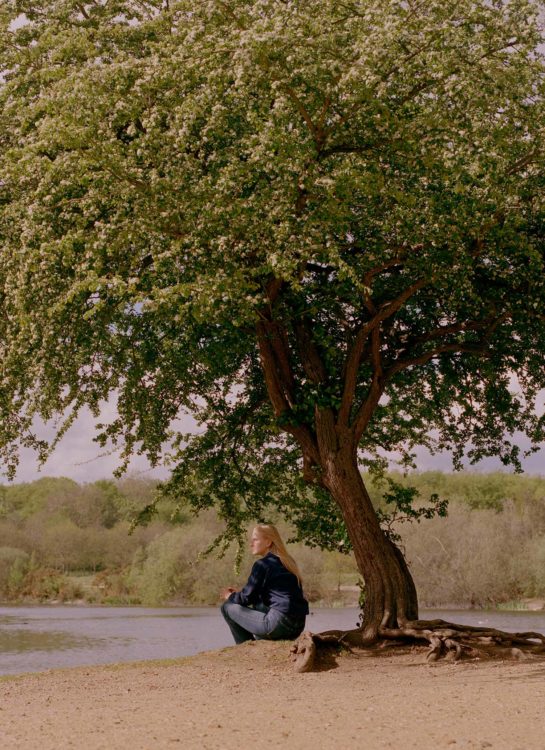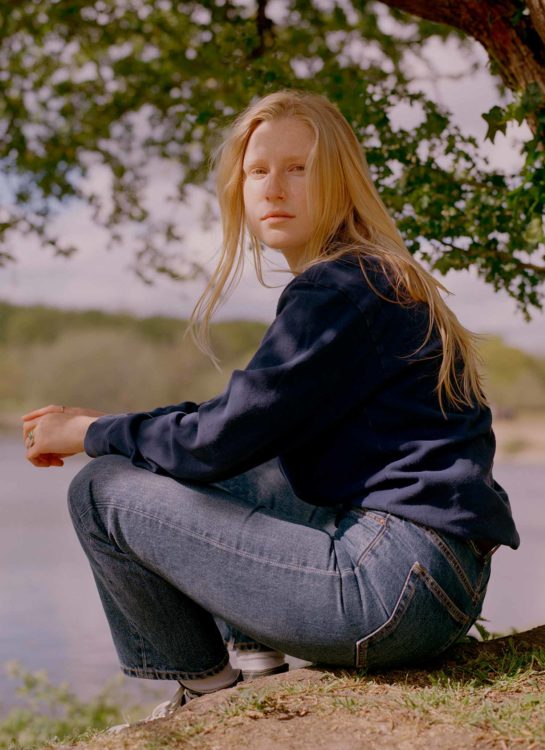- Words Saskia Postema
- Photography Jack Orton
- Production Studio Notion
Indie singer-songwriter Billie Marten is turning over a new leaf. She speaks about embacing her roots in order to evolve her sound for her new album, 'Flora Fauna'.
Singer-songwriter Billie Marten is soft-spoken, thoughtful and an avid lover of nature – in case the title to her new album ‘Flora Fauna’ didn’t give that part away. “It’s just something that’s completely non-judgmental and it’s there forever – you can take it or leave it when you want, and I love that,” she tells me about her love for everything green. “It’s just something really important and often overlooked – you don’t have to be a really professional gardener to enjoy nature, or really good at walking or cycling you know?”
Perhaps in another life, Marten could’ve been a wood nymph, luring people into nature by singing them gentle, acoustic folk songs. At only 21, she’s already a veteran when it comes to music, after being hailed one of BBC’s Sounds of 2016. In fact, ‘Flora Fauna’ marks her third album, but it’s her first under an independent label and new management team. In a way, it feels like her second flight. “It’s like I’ve lived four years in every one year, and I didn’t register it at all. I should be finishing my degree, thinking about which avenue I want to go down – take an apprenticeship, move to a different city, live with people for the first time. But I’m already five or six years into all that, and I’ve moved at an incredible pace without realising. Now I’m like, I know what’s up. This is the second coming, indeed,” she jokes.
The inspiration for her album is a result of said realization, with Marten having taken more control of her career and life. Some of the resulting decisions are small, but impactful. For example, she’s committed herself to being a bit more selfish and taking more time to return to her roots, literally. In fact, when we talk over Zoom, Marten’s staying at a friend’s parents’ house outside of London. “I had the opportunity to go to the country side this week for a couple of nights, so I took it. It’s amazing, I’m just so much happier when I’m in the green.”


Being out of London has been instrumental in crafting the album, providing her with a different perspective and a certain sense of freedom to do what she wants. “It’s just much more of a freeing experience. There’s much less of an industry situation where you feel the entirety of London is looking over your shoulder. It feels more like a return to when I first started writing, being in the semi-rural area and having lots of time and space to think properly.”
That’s of course not to say that Marten doesn’t like the city – she lives there, after all. “Cities are a bit like a weird drug, especially London. The city’s great and a pillar of culture. Everything’s there at your feet all the time. You can buy fruit and veg at 4AM if you want to,” she jokes. “It’s accessible and there’s so many different people there. But it doesn’t have everything that I need, and I think I’m learning to be a bit more selfish about that,” she confesses. “I’ll always change my mind and there’s definite glimmers of amazing lights that come from London. You can forge a plan within 10 minutes and you’re incredibly ensconced in that big life living. But it’s most definitely not forever,” she adds with a smile.
Being selfish in figuring out what you want versus what you need, and prioritizing those needs is something that not everyone her age has figured out just yet. Marten, however, seems incredibly self-aware and at ease, surrounded by nature’s gentleness and its peace and quiet. “I prefer a much slower pace. It’s a lifestyle that suits me. I’m really crap at nine-to-fives and I’m so bad at going to the studio every day. Maybe I’m kind of just entering retirement now, and I’m okay with it,” she grins. “I’m embracing it. I have the wild touring life and the industry schmoozing in London, and then here I have me planting my seeds and using my feet properly and having much better posture and lungs.”
In a sense, her new album reiterates what Marten reveals about her trial separation with London. She simply feels much more at home in the countryside than she does in the big city. “Everyone’s very tall and big and has huge personalities. I chameleon into them but not very well, which just means I’m still kind of hunched over and trying to protect myself. Music gives you terrible posture, but then as soon as you leave, everything’s lighter and clearer – it’s amazing!”


She confesses that she’s been thinking about moving out of the city, wondering briefly why she moved there in the first place. It’s perhaps somewhat ironic that music is what led her to London, and now music is demanding her to leave city life behind instead. “I love it [music] with all my heart, it’s just that I’m constantly in this argument with myself of hating modernity and starting music because it’s an incredibly ancient craft. My dad taught me guitar when I was 7 or 8, it was in the family. I went away and wrote little songs, but it wasn’t for a wider audience. And then all of a sudden you’re in it. It’s such a blessing and glorious place to be, but there are certain aspects to it that just don’t rub well with my personality. It’s an incredibly different lifestyle to adopt very quickly.”
Marten sees it as a full circle moment, illustrative of how she’s grown up and figured out what does and doesn’t work for her as an artist, and a human being. “One of my first singles was called “Ribbon” and was about getting the train to London and how exciting that was and how I’d love London. And now, with this album, it’s sort of like I’m taking the train journey home.”
Compared to those early days of acoustic folk, the material on ‘Flora Fauna’ is a lot punchier and direct, relying heavily on the use of rhythm & bass as the backbone to the songs. “At the beginning [of my career], it was more so about trying to carve a character,” she explains. “That ultimately was a tortured soul, melancholic, whispering waif. And then you lean into that character and then you only write about that, forever. Now I don’t have the fear to address things plainly anymore. And it comes with age, experience, knowing yourself a little bit more. You just get fed up with being abstract and vague, and sometimes you just gotta say it. It’s not like – I’m not like, becoming Eminem or anything. But it’s definitely a push for me.”
One song that stands out on the album is “Ruin”. Marten elaborates: “It’s a song where I was at the height of disappointment with myself and everyone else. I was just kind of floating around and hanging around with bad people, wasting time. I just wanted to wallow in it a bit, a song that was dirty and dark and not very pleasant. But it’s not – if I sang it now, I think I would give it a bit of a different delivery. Make light of it a bit more, because these are just fleeting moments and I don’t feel like that all the time, I certainly don’t feel like that now. But I am drawn to those lyrics and that melancholy.”


She confesses that it’s sometimes more beautiful to her than songs about sunshine-y days. Still, a pivot in sound also meant a pivot in musical influences, as she tried to get away from the folk-leaning inspirations like Joni Mitchell. “I’ll never get rid of that fully, but it was an experiment. So instead I looked for that analog but digital sounding vibe, a lot of grungy American stuff. Like, John Grant, Arthur Russell, Fiona Apple, and Phoebe Bridgers.”
She didn’t have to think very hard or long about what tracks would end up on the album. Sure, there were some songs she had to bin because she “just had nothing to say”, she starts. “But mostly, it was a small batch. I’m a sporadic writer, it takes a lot of time for me to write 10 songs, where other artists may write 100 songs and then whittle it down to 10. I like concentrated writing, I’m just not very good at throwing stuff away, I like to finish things properly. If it doesn’t come naturally, then I’ll abandon – but I won’t throw away finished songs, and these just all happened to fit with everything with the same tone and feel to it.”
The biggest mood-killer for Marten’s creative flow? Putting her in a studio. “I’m actually the worst if I try to put myself in the studio. Something about that environment makes no creativity happen for me. I associate studio with production and I always come in with a fully-fledged song. We’re layering up and it’s an amazing experiment and it’s so tactile, you’re fiddling about with sounds and scapes, and it’s fun,” Marten sighs happily. “So if I were to go in with nothing and would have to write there, it’d be so daunting.”


She is particular about the production, mirroring the maturity displayed on the record in her quest for more agency and ownership. Marten is carving out her own path – her own formula for flourishing as an artist. “I’d love to do more with it [production]. I’ve always been heavy on the co-producing aspect. It’s important to not let songs kind of fly away with another person, as you made them and they should sound the way you want them to sound. I’m just getting back to the more technical side of things. I have huge gaps of knowledge, probably due to having been so young when I started out in the industry and being surrounded by men. So I just didn’t ask enough questions, but I’m relearning how to do things, even just basic cabling.”
Marten feels lucky that her new label trusted her to explore and experiment with her artistic identity. “I was very impressionable at the start, and a corporation as big as Sony – it’s so fickle and horrible, I hated it. Which is sad, because it puts such a downer on you as a person, cause you’re deflated and unenthusiastic and you feel very small. Now, I have a group of loving people that helped me feel a lot more comfortable expressing everything, to just be vulnerable. They completely trusted me to go in and do this album – even when they only had two songs to listen to when I signed. I was able to present it the way I wanted to present it, did my own visuals. I was left alone, but not neglected.”
It’s resulted in some of her proudest work yet. “There’s a song called Human Replacement, and I’m really scared about that one. I feel like it’s going to halve my listeners. It’s such a different sound, tonally speaking, that’s come out of me. No element is really melodic or floaty or pretty. I couldn’t talk about a long-lost love or Emily Bronte or something, it had to be toothy. But it’s so fun to play, and the subject matter is difficult. It’s all about not being able to go out at night as a woman, and we’ve really addressed that plainly in the video, so it’s just moments like that that I never could’ve anticipated.”
The album does eventually lean into a smaller sound towards the end of the tracklist. Marten explains it was important to her to cover both – as it’s part of who she is, too. “With every new song you put out, you’re adopting a new scripture almost – a new belief or personality. I wanted to make it clear that I’m not having a complete make-over. I’m not going to turn into a punk-rock princess all of a sudden.”


Regardless of genre or soundscape, it’s Marten’s voice and lived experiences that binds everything together. For example, the album closes with “Heaven”, a personal reflection on the role religion has played in her own life and family. “I grew up with a conflicting idea of religion. My dad was a strong Atheist, and my mom’s a Christian. I saw my brother – who’s ten years older than me – go through church, then leave it. When I was growing up, it was definitely not cool to have religion. It’s just a time in my life I often forget about, but I’m also weirdly quite defensive about it,” Marten starts. “I wouldn’t say I have faith now, or ever – I was more of an observer. Sometimes, something as enormous as that idea is too big to adopt entirely. So it’s about taking small things from different cultures, people and their belief systems. The one thing I took that my mom heavily ingrained in me was ‘have a kind heart’. It’s the small things like holding a door open or having a conversation with a stranger. I was also in a fleeting relationship with a Buddhist for a while, and he used to chant every morning for an hour, and while it’s on the other side of the spectrum – they both share this idea of salvation, of getting somewhere at the end and having that release. I just needed to ponder it, ask some questions.”
It’s why she likes taking her time, to get her thoughts in order and weigh her words carefully. “I always write about things I don’t say that much in real life, music is an excellent outlet for honesty. A lot of the things I struggle – if you’d ask me to read out my lyrics to you, I’d struggle with that, but I can sing them just fine. It’s another way of cryptically expressing yourself.”
At the end of the day, the message that’s most present in Marten’s ‘Flora Fauna’ is that of relief and self-acceptance, mirrored by the songs she chose as bookends to the album; “Garden of Eden” and “Aquarium”. It’s a journey with twists and turns, but one that Marten has wholeheartedly surrendered herself to. She’s come out a stronger and more confident artist – with a really solid third album to boot.

